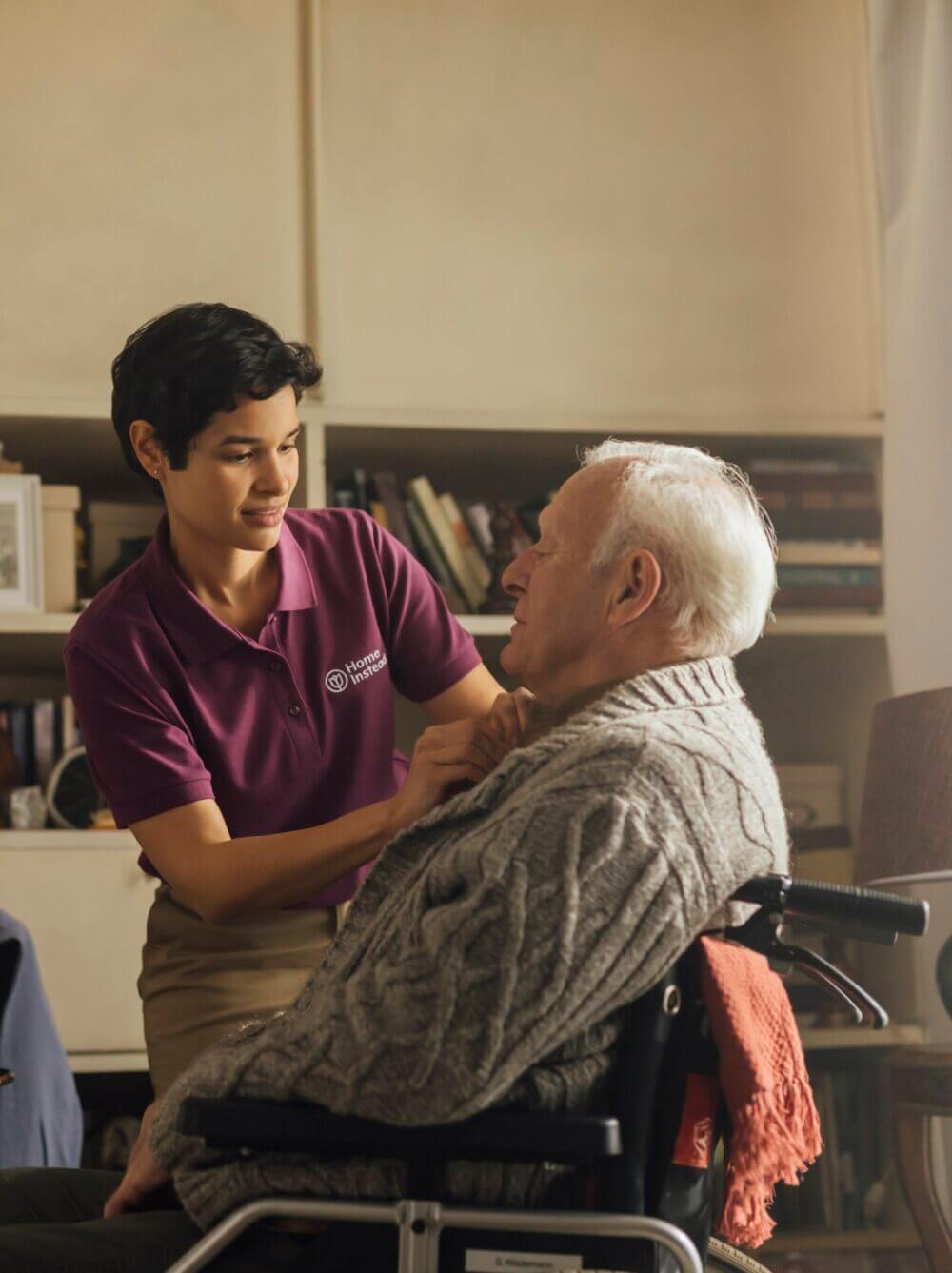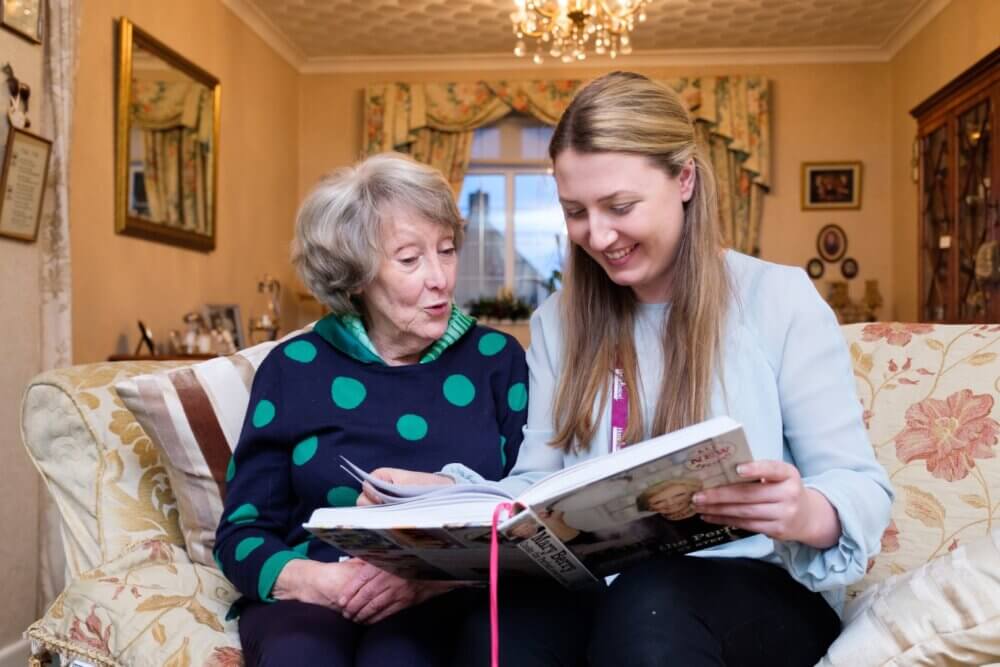Supporting Alzheimer’s Care at Home: A Thoughtful Approach
Caring for someone with Alzheimer’s can be challenging, but there are ways to make the experience smoother and more supported.

Personalised In-Home Support for Alzheimer’s
Home Instead offers specialised, in-home services designed to meet the unique needs of individuals living with Alzheimer’s. These services aim to offer practical support, emotional well-being, and peace of mind for families.
This article examines how home care can benefit individuals with dementia, providing tips on creating a care plan that works within familiar surroundings.

Understanding Alzheimer's and Its Impact
Alzheimer’s affects not just the person diagnosed but also their family and friends. Learning to recognise symptoms early can help families respond effectively and create a care plan that maintains a loved one’s quality of life.
Many families choose home care to allow their loved ones to remain in familiar environments, surrounded by loved ones and cherished belongings. Home Instead’s trained Care Professionals offer both practical and emotional support, ensuring that the individual and their family receive the assistance they need.
Early Signs and Symptoms
In the early stages, Alzheimer’s may manifest as memory lapses, confusion, or difficulty with routine tasks. These can be subtle, but it is important to acknowledge them to provide timely care and support.
Progression of Alzheimer’s
Alzheimer’s typically progresses through three stages—early, middle, and late—each with increasing care needs. Families will need to adapt their care strategies over time as symptoms become more pronounced.

The Benefits of In-Home Care for Alzheimer’s
Home Instead’s in-home care provides a comfortable, familiar environment for individuals with Alzheimer’s. Maintaining routines and familiar surroundings can help reduce anxiety, promote independence, and create emotional stability.
Familiar Surroundings
Staying at home offers continuity, comfort, and the reassurance of known surroundings. Keeping a person in familiar settings allows them to retain a sense of control and identity.
Personalised Care
In-home care is tailored to the individual’s needs, focusing on their personal preferences, history, and routine. This approach has been shown to reduce anxiety and agitation, improving the quality of life for both individuals and their families.

Home Instead’s In-Home Services for Alzheimer’s Care
Home Instead provides a range of in-home care services that are designed to meet both the physical and emotional needs of individuals with Alzheimer’s, as well as offer much-needed support to family caregivers.
Personal Care
Assistance with daily tasks such as bathing, dressing, and medication management ensures that individuals maintain their dignity and hygiene. Home Instead’s Care Professionals are trained to handle more specialised care requirements as needed.
Companionship
Companionship plays a vital role in enhancing the well-being of individuals with Alzheimer’s. Whether it’s through engaging activities or simple conversation, regular visits from Care Professionals can help alleviate loneliness and provide emotional comfort.
Home Help
Home Instead also offers assistance with light housekeeping, meal preparation, and transportation services, allowing families to focus on spending meaningful time with their loved ones.

Developing Effective Alzheimer’s Care Plans
Creating a safe and structured environment is essential for those living with Alzheimer’s. By establishing routines and activities that promote cognitive engagement, families can help their loved ones maintain independence and well-being.
Creating a Safe Environment
Home Instead can assist in creating a secure home environment, reducing risks and offering advice on useful tools such as alarms or reminders.
Establishing Routines and Activities
Routines that are meaningful and enjoyable for the individual can enhance their quality of life. Home Instead’s Care Professionals develop personalised care plans that incorporate daily activities designed to promote emotional well-being and cognitive stimulation.

Professional Support for Family Caregivers
Caring for someone with Alzheimer’s can be overwhelming, and it’s important for family caregivers to seek professional support to avoid burnout. Respite care services from Home Instead allow caregivers to take breaks while knowing their loved one is in safe hands.
Respite Care
Respite care provides relief for family caregivers, ensuring they can rest and recharge while their loved one continues to receive quality care.

In-Home Care as an Alternative to Residential Facilities
Choosing between in-home and residential care is a significant decision for families. In-home care can offer a more personalised approach, allowing individuals to stay in familiar surroundings while receiving the support they need.
Benefits of Home Care
Home care provides continuity, allowing individuals to maintain routines and hobbies, stay connected with family, and keep beloved pets. It also enables families to stay closely involved in their loved one’s care.
Making the Decision
When deciding between home care and residential facilities, families should consider the level of care required, financial implications, and the preferences of the person needing care. Respecting the individual’s wishes is crucial in making the best decision.

Frequently Asked Questions
What should be avoided when caring for someone with Alzheimer’s?
It is important to provide autonomy and avoid arguing or reminding them of distressing events. Focus on the present rather than asking questions about the past.
When is it time to consider residential care?
If caring for someone with Alzheimer’s becomes overwhelming or too difficult to manage, it may be time to consider residential care.
What are the early signs of Alzheimer’s disease?
Memory loss, confusion, and changes in behaviour or mood are some of the early signs.
How does Alzheimer’s progress?
Alzheimer’s progresses through three stages, each with increasing care needs as the condition worsens.
What are the benefits of in-home care for Alzheimer’s?
In-home care allows individuals to stay in familiar surroundings, maintaining routines and receiving personalised support that promotes independence and emotional well-being.

Areas We Serve
Wythenshawe, Woodhouse Park, Benchill, Sharston, Northenden, Moss Nook, Peel Hall, Baguley
Brooklands, Sale, Ashton upon Mersey, Altrincham, Bowdon, Hale, Broadheath, Timperley
M22 0, M22 1, M22 4, M22 5, M22 8, M22 9, M23 0, M23 1, M23 2, M23 9, M33 1, M33 2, M33 3, M33 4, M33 5, M33 6, M33 7, M90 1, M90 2, M90 3, M90 4, M90 5, WA14 1 ,WA14 2, WA14 3, WA14 4, WA14 5, WA15 0, WA15 6, WA15 7, WA15 8, WA15 9,
The Parflo Building, Huxley St, Broadheath, Altrincham WA14 5EL, UK
0161 506 8307